This piece was inspired by an episode of The Cooler, KQED’s weekly pop culture podcast. Give it a listen!
How Rosie O'Donnell vs. Elisabeth Hasselbeck Predicted Our Current Political Discourse

Certain historical events leave a mark. Some even go on to define entire generations. Where were you when JFK was shot? When Obama won the 2008 election? When Kurt Cobain died? When O.J. tried to speed away from the law in a Bronco? It makes sense why we can’t shake these moments; they changed the landscape of politics, culture, and so much more.
But iconic historical moments are not all created equal. There are macro events, like the ones mentioned above, that affect a grand swath of people, and then there are smaller, less significant cultural moments that only stick in the minds of a select few.
Do you remember where you were on May 23, 2007? I’m guessing that’s a no. But I do. That was the day Rosie O’Donnell and former Survivor contestant / conservative pundit Elisabeth Hasselbeck yelled in each other’s faces on The View, leading to the show’s first use of a split-screen, and Rosie’s premature exit from the show. Daytime TV had never been so radical or so real.
But before we get into the impact of that moment, let’s get some backstory:
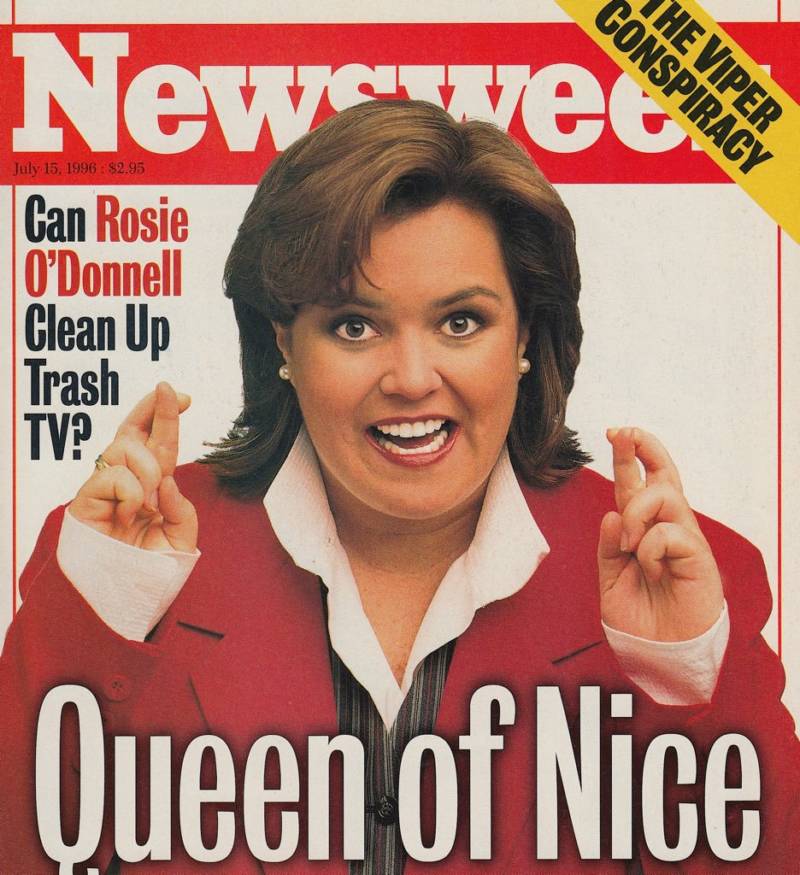 Rosie O’Donnell made a name for herself in movies like A League of Their Own, The Flintstones, Sleepless in Seattle, and Harriet the Spy. But with her talk show, The Rosie O'Donnell Show, she really shot to fame, like a koosh ball arcing into a studio audience. She came to be known as the "Queen of Nice." She kept conversations with her celebrity guests fun and light. Still in the closet, she played up her love of Tom Cruise. She made strangers' lives better by giving away scholarships, donations, and gifts. She sang show tunes and geeked out over Barbara Streisand. She did everything Ellen now gets to do (thanks to Rosie paving the way).
Rosie O’Donnell made a name for herself in movies like A League of Their Own, The Flintstones, Sleepless in Seattle, and Harriet the Spy. But with her talk show, The Rosie O'Donnell Show, she really shot to fame, like a koosh ball arcing into a studio audience. She came to be known as the "Queen of Nice." She kept conversations with her celebrity guests fun and light. Still in the closet, she played up her love of Tom Cruise. She made strangers' lives better by giving away scholarships, donations, and gifts. She sang show tunes and geeked out over Barbara Streisand. She did everything Ellen now gets to do (thanks to Rosie paving the way).
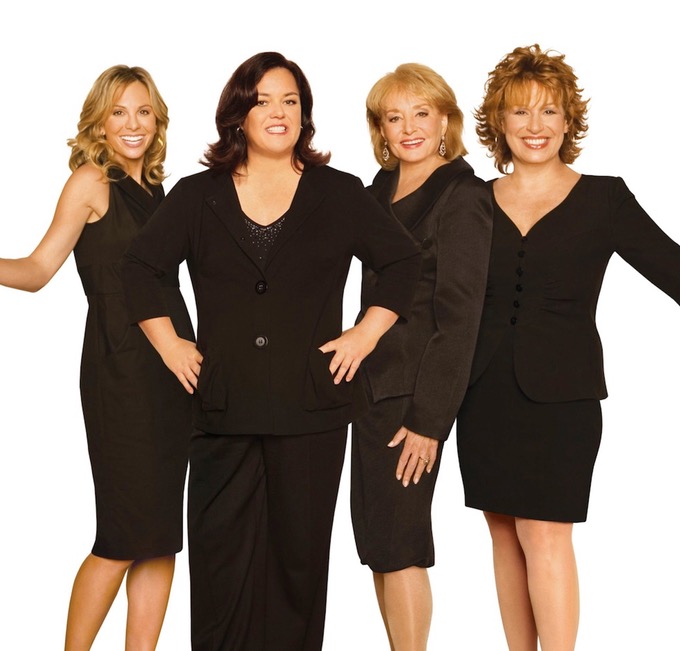
After The Rosie Show ended, six seasons later in 2002, Rosie left the limelight to focus on her family. It wasn’t long before people in the industry tried to coax her back onto daytime television. She turned down all offers -- until one of her childhood idols, Barbara Walters, asked her to be the main host of The View. She agreed, and returned to the space that put her on the map.
But the Rosie that showed up on set in 2006 was not the Rosie America had grown accustomed to. This new Rosie was an out lesbian who was no longer afraid to speak her mind on politics and everything else. Rather than keeping it cute, Rosie had found her voice and wasn’t going to give it up without a fight. After years of saying what America was ready to hear, she switched gears to what America needed to hear.
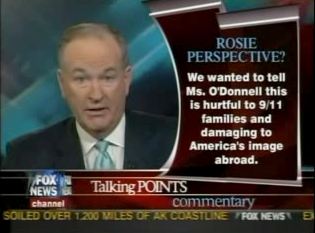 Her stint on The View lasted only a year, and was filled with drama at every turn. Fox News regularly attacked her for her views on the Iraq War and President George W. Bush. This, remember, was in the wake of the Dixie Chicks being blacklisted for their political opinions, which created an environment that equated criticism of Bush and his administration's policies with being anti-American or unpatriotic. Donald Trump also got into the action, attacking Rosie for bringing up his bankruptcies and mocking his combover, calling her "a woman out of control" and threatening to sue her ("Rosie will rue the words she said. I'll most likely sue her for making those false statements -- and it'll be fun. Rosie's a loser. A real loser. I look forward to taking lots of money from my nice fat little Rosie").
Her stint on The View lasted only a year, and was filled with drama at every turn. Fox News regularly attacked her for her views on the Iraq War and President George W. Bush. This, remember, was in the wake of the Dixie Chicks being blacklisted for their political opinions, which created an environment that equated criticism of Bush and his administration's policies with being anti-American or unpatriotic. Donald Trump also got into the action, attacking Rosie for bringing up his bankruptcies and mocking his combover, calling her "a woman out of control" and threatening to sue her ("Rosie will rue the words she said. I'll most likely sue her for making those false statements -- and it'll be fun. Rosie's a loser. A real loser. I look forward to taking lots of money from my nice fat little Rosie").
As if that wasn't enough, Rosie had to regularly go toe-to-toe with panelist Elisabeth Hasselbeck, who was aided by an executive producer who -- rumor has it -- fed Hasselback with Republican party talking points every morning. Every weekday, in front of millions, Elisabeth would dish out an entrée of alternative facts, and Rosie would take the bait.
The near-constant sparring resulted in numerous news cycles of Rosie being painted as the alleged bully and antagonist to Hasselbeck’s innocent-seeming, pretty, conservative Christian (one Los Angeles Times piece went with the headline "The 'Queen of Nice' Goes Nuts"). The fact that Hasselbeck was pregnant for this particular season of The View didn’t necessarily help optics.
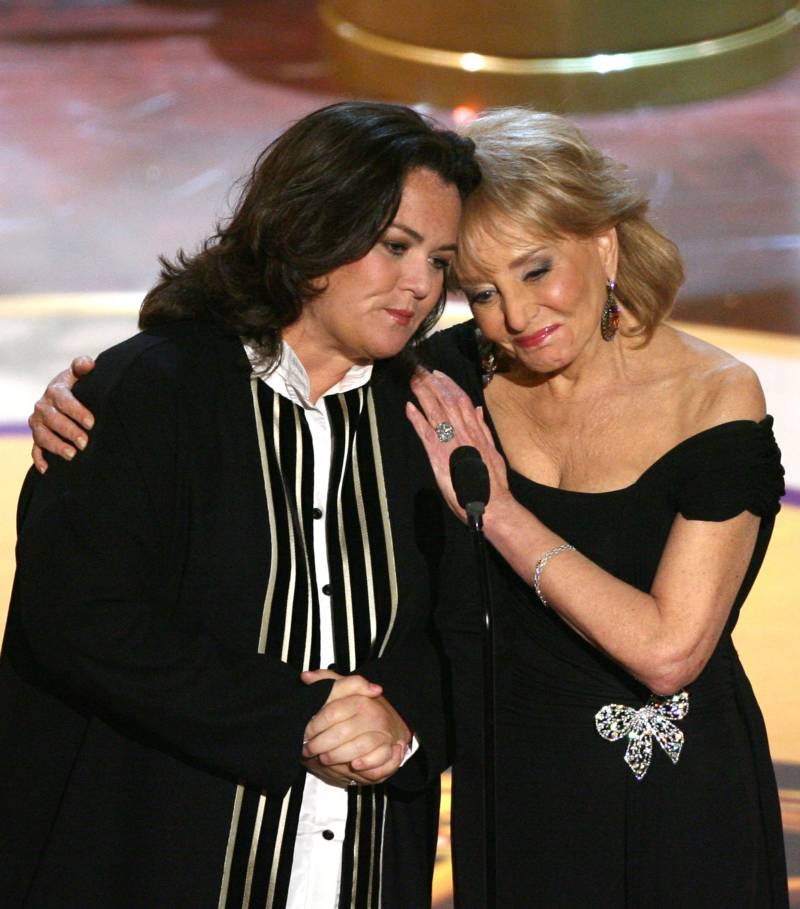
Each time some feud blossomed, The View enjoyed huge ratings, leading to a 17% increase in viewers from the previous Rosie-less season. Despite having a hit on their hands, things weren’t too joyous behind the scenes. A culture of distrust began to build; Rosie felt as though Walters, whom she thought of as a surrogate mother, didn’t have her back -- and that Walters and the show's producers were setting her up for more and more fireworks with Hasselbeck.
On May 23, 2007, everything finally boiled over. Comedian Joy Behar started a conversation about Al Gore and Jimmy Carter's belief that Bush was the country’s worst president, and listed Bush’s bad qualities (his handling of torture at Abu Ghraib; his response to Hurricane Katrina; his repeated mispronunciation of "nuclear"; the time he choked on a pretzel). Joy, Elisabeth, and Sherri Shepherd (a woman who, on a different episode of The View, said the world might actually be flat) got into it for several minutes, while Rosie sat quietly. Tired of having her words misconstrued by Fox News every night, she was waiting for the clock to run out on her contract in a few weeks. But she couldn’t help but say something in response to Elisabeth calling Iraqis our enemies.
Things quickly exploded:
Six uninterrupted minutes of an epic, messy, personal fight ensued. The curtain was pulled back to reveal not just TV personalities debating "hot topics," but one human being feeling betrayed and used by someone she thought was a friend.
This moment evokes and pokes holes in an idea that's been batted around a lot since the 2016 election -- that the way to heal the divisions in the country is for people from opposite ends of the political spectrum to engage in conversation. (If only liberals and conservatives had broken bread and chatted about their differences over some Budweisers, the thinking goes, then the country wouldn't have elected a man who called Mexican immigrants "rapists," mocked a disabled reporter, promised to ban Muslims, and admitted to sexual assault on camera.) But no matter how good anyone's intentions may be, it can be impossible to have a productive dialogue when one person's belief system is founded in another's oppression, or argues against another's humanity and right to exist. There’s isn’t anywhere to go from there.
During the back-and-forth, Rosie noticed that the producers had placed a split-screen between the two women so that viewers at home could watch each of their faces getting redder and angrier. The split-screen had never been used on the program before, and Rosie has said that she believes they crafted it specifically for this inevitability, which they seemed to hope would happen someday. They got their wish, and Rosie didn't return to the show the next day -- or the following day, or the one after that. A few weeks before her contract expired, Rosie quit.
Last week marked that moment’s tenth anniversary. A lot has happened in the past 10 years, but has our discourse really changed that much? After a detour to the left during the oasis of Obama, we’re right back into a timeline where criticizing the President or his administration is seen as unpatriotic. These days, President Trump will tweet about any celebrity who criticizes him (Rosie is still one of his favorite targets, so much so that he randomly brought her up during one of the 2016 presidential debates). And, beyond celebrities, working journalists are regularly attacked -- figuratively and literally -- for reporting the facts. Trump declaring the press “the enemy of the people” and “fake news” has engendered a culture in which a Montana Republican seeking election body-slams a reporter for asking a question, and it’s not even the most shocking news item of the day.
Every year, reality TV thrives more and more on conflict, overturned tables, wig tugs, and televised celebrity firings. It's gotten so bad that, on Love & Hip Hop Hollywood, one woman vomited into her hand and threw it in another woman's face. Has reality TV influenced us into becoming more conflict-oriented? Or has reality TV simply been holding up a mirror to what we already were? It's hard to say, but something that’s clear is that this moment between Rosie and Elisabeth foretold what we’re living through now: a culture of division, and a culture in which someone speaking or reporting truth will be smeared or punished.
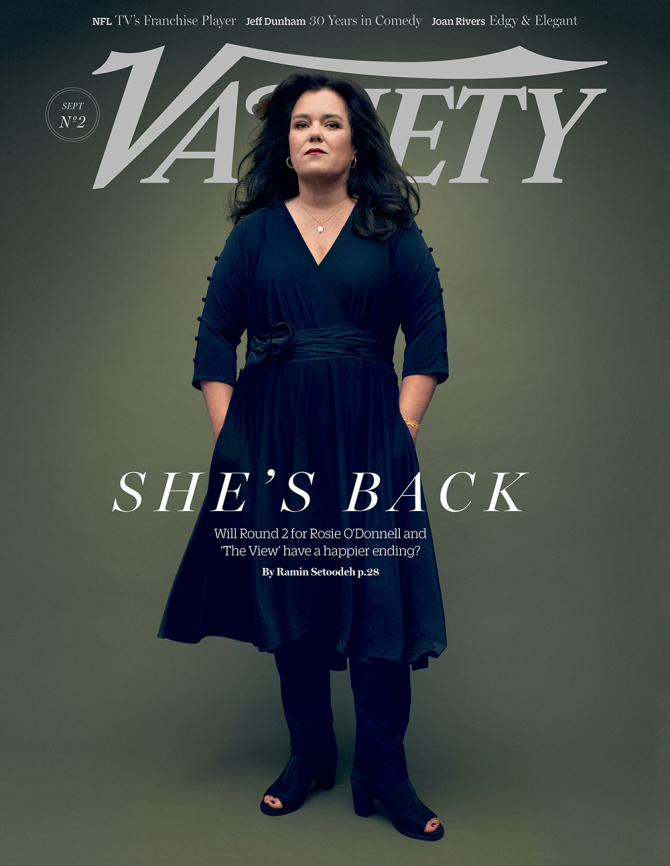 Since their epic showdown, Rosie has returned to stand-up and acting. Hasselbeck moved over to Fox News, where she was able to make statements like “Why has the Black Lives Matter movement not been classified yet as a hate group?” before eventually being replaced by another young blonde woman. In 2014, when Elisabeth heard that Rosie was asked to return as a host of The View, she did not take the high road: "What could ruin a vacation more than to hear news like this?" she said. "Talk about not securing the border. Here comes to The View the very woman who spit in the face of our military, spit in the face of her own network and really in the face of a person who stood by her and had civilized debates for the time that she was there. I am happy to have a #momversation about why I would never defend her 2007 comments. #letfreedomring."
Since their epic showdown, Rosie has returned to stand-up and acting. Hasselbeck moved over to Fox News, where she was able to make statements like “Why has the Black Lives Matter movement not been classified yet as a hate group?” before eventually being replaced by another young blonde woman. In 2014, when Elisabeth heard that Rosie was asked to return as a host of The View, she did not take the high road: "What could ruin a vacation more than to hear news like this?" she said. "Talk about not securing the border. Here comes to The View the very woman who spit in the face of our military, spit in the face of her own network and really in the face of a person who stood by her and had civilized debates for the time that she was there. I am happy to have a #momversation about why I would never defend her 2007 comments. #letfreedomring."
As far as I know, Rosie didn't respond to Elisabeth's remarks or take her up on that "#momversation," and I don't blame her. As comforting as the notion of healing through conversation may be, I don't see much hope for Rosie and Elisabeth to ever mend fences. And the way things have gone in the past 10 years, I'm not sure "conversation" is going to unite the divided left and right in America either. But I hope I'm wrong. I really do.

